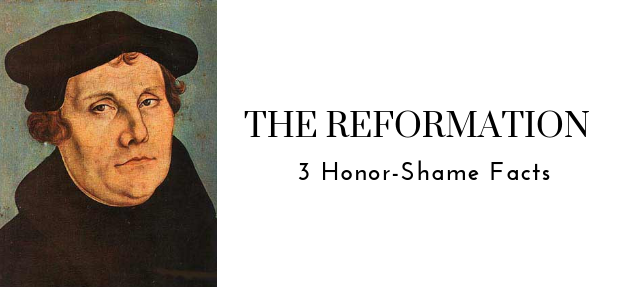The Reformation: 3 Honor-Shame Facts
The dynamics of honor and shame influenced the events of the Reformation, especially in the early years. This post sheds light on the social context surrounding the theological controversies that shook the Western world 500 years ago.

1. The German Motive for Reform
Luther’s 95 Theses and subsequent writings spread like wildfire in Germany. Luther garnered quite a following from his fellow Germans. For example, his journey to the Diet of Worms (1521) was celebrated by great fanfare in one town after another. However, the strong support Luther received was largely for political reasons.
The people of Germany felt plundered and disrespected by the Pope. In an era when politics and religion were inseparable, Luther’s writings fueled a national independence movement. The Germans were eager to throw off the oppressive and degrading shackles of their Italian overlords from Rome.
Even at the Diet of Worms when Luther defended his theology, he blatantly appealed to these nationalistic sentiments. “Property and possessions, especially in this illustrious nation of Germany, have been devoured by an unbelievable tyranny! Should I recant at this point, I would open the door to more tyranny and impiety.”
Germans found Luther to be their champion standing against the tyranny of Rome. He would deliver them from the shameful oppression and restore their status. In this German political context, Martin Luther and his theology found sanctuary.
2. The Catholic Response
Rome’s strategy against Luther was classic name-and-shame. Rome tried many tactics to squash Luther’s voice and put out the flames of open revolt against Rome’s authority. For example, representatives of Rome claimed that Luther was conceived when the devil raped his mother in an outhouse. Their smear campaign against the German monk reflected a crude political campaign more than a theology debate. Here is the edict issued against Luther after his famous trial at the Diet of Worms. Note language for shaming Luther and his community.
“This devil in the habit of a monk has brought together ancient errors into one stinking puddle and has invented new ones. … He lives the life of a beast…. Luther is to be regarded as a convicted heretic. When the time is up, no one is to harbor him. His followers are to be condemned. His books are to be eradicated from the memory of man.”
3. Luther’s Response
Martin Luther spared no derision against the Pope. He referred to Rome as “Babylon” and the “anti-Christ,” mostly because the Roman church claimed she herself (not Christ) was the agent of salvation. However, even several years into the controversy Luther maintained a high degree of respect for Rome and desired church unity. In a letter drafted for Pope Leo in January 1519, Luther writes:
“The honorable Sir Charles, chamber secretary to Your Holiness, … very harshly accused me in the name of Your Holiness of lacking respect for and being rash toward the Roman church and Your Holiness, and demanded satisfaction for this. Hearing this, I was deeply grieved that my most loyal service has had such an unhappy outcome and that what I had undertaken–to guard the honor of the Roman church–had resulted in disgrace. …
I cannot under any circumstances recant anything if I want to honor the Roman church–and this has to be to my primary concern. Such a recanting would accomplish nothing but to defile the Roman church more and more and bring it into the mouths of the people as something that should be accused. See, Father, those whom I have opposed have inflicted this injury and virtual ignominy on the Roman church among us. With their most insipid sermons, preached in the name of Your Holiness, they have cultivated only the most shameful avarice.”
In this letter, Luther shows a keen sensitivity to the underlying problem of the controversy he instigated—the apparent disgrace of the Roman church. But in a masterful way, Luther attempts to reframe the narrative—he only seeks to bring honor to the Roman church, and the true source of shame is the envoys sent from Rome to oppose Luther.
Conclusion
Reformation theology arose in a particular social context shaped by honor-shame dynamics in key ways. To understand the theology of the Reformation, we must take note of the context of the Reformation.

Thank you. This is a great application of HS insight and very enlightening.
Dear Jayson Georges ao., since I don’t have your e-mail adress, so sorry, I use this channel to reach out for Jayson with the request to help me on information about a ‘shame-reading’ and/or ‘fear-reading’ of Psalm 82. In my contacts in Indonesia I received a question about this Psalm and I would like to answer properly. Please, can you give me a hint of tip, of maybe any info, literature? Maybe you ever wrote a blog on this Psalm? Thanks for answering me, use my e-mail: haakcj48@gmail.com. God bless. Kees.
Thank you for these insights into the larger social, political and rhetorical context of the Lutheran call for reform.
Meanwhile, on the theological level, it is the fear-power aspect of Luther’s spiritual journey — and testimony — that has struck me this season.
Granted, before his conversion (circa 1514, so some time before his 95 theses), Luther was afraid not of spirits as manifested in animism, but of the judgment of almighty God. But his most famous hymn speaks of God as “a mighty fortress” in which believers are protected from “all mortal ills”; confesses that “our own strength” is insufficient, but it is the Lord of Hosts Himself who is on our side; and exclaims that no matter the danger we face from devils, “we shall not fear for God hath willed His Truth to triumph through us.”
His protestations against, for example, the Church’s promotion of the practice of indulgences (a puny human ritual) are in keeping with his declaration of the sufficiency of Christ in attaining Security, as well as with his concern, noted in this post, for Her honor.